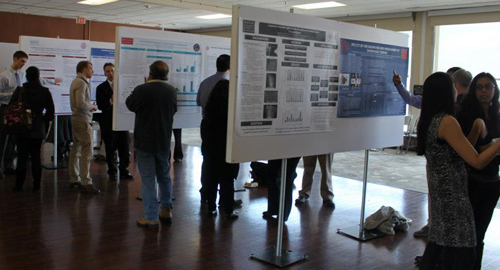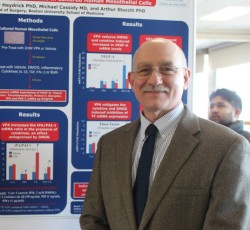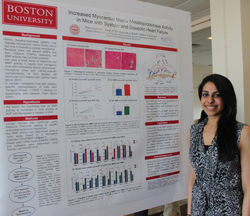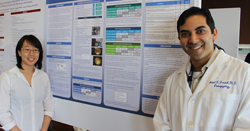Learn About the Medical Student Summer Research Symposium
The Hiebert Lounge was awash in posters on Wednesday, Feb. 6, as the annual Medical Student Summer Research Program (MSSRP) symposium was held to showcase student research. Students received awards for the best basic science, clinical science and medical education research posters. View the facebook album.
 Hiebert Lounge filled with students and posters.
Hiebert Lounge filled with students and posters.
The MSSRP offers first-year Boston University medical students scholarships to complete eight-week research projects with a BUMC faculty member. During the summer of 2012, 27 students participated in the program.
“The MSSRP supports students who want to engage in rigorous research that enriches their academic and clinical experiences,” says Suzanne Sarfaty, MD ’88, assistant dean for academic affairs and director of the program. “Many of these students go on to publish their research or present it at national meetings.”
The awards are named in honor of Jerome Serchuck, one of the longtime donors to the MSSRP. Mr. Serchuck has given generously to the research program from its official establishment in the summer of 2000 when fifteen members of the BUSM class of 2003 undertook research in various BUMC departments. The first Serchuck Awards were presented in 2007, and the program continues to flourish as a direct result of his ongoing support and generosity.
“We are deeply grateful to the Serchuck family for their continued, generous commitment to the program and the advancement of our medical students,” says Sarfaty. “Also key to the success of the program is the support of departments and the dedicated work of faculty who guide the research. This program would not be possible without them.”
 Arthur Stucchi
Arthur Stucchi
Arthur Stucchi, PhD, research associate professor in the Department of Surgery who has mentored more than 25 medical students since 1998, is one such mentor. “The MSSRP affords students the opportunity to broaden their critical and analytical thinking skills and to gain a deeper appreciation of the importance of the medical and scientific literature in making informed decisions,” he says.
 Parul Agarwal
Parul Agarwal
Parul Agarwal won the award for best basic science poster for research on “Increased Myocardial Matrix Metalloproteinase Activity in Mice with Systolic and Diastolic Heart Failure” and Kevin Barrette won the honorable mention for basic science poster for “Connexin 43 (Cx43) upregulation protects retinal endothelial cells against high glucose insult.” The best clinical science poster award went to Divya Ahuja for a study of “The impact of race, primary language, marital status, and insurance type on mortality in breast and prostate cancer patients,” and Luke Stevens won honorable mention for for his research on “Evaluation of patient understanding of emergency department discharge instructions: use of a scale to assess self-efficacy to carry out discharge instructions.”
 Stephanie Wong
Stephanie Wong
The first Serchuck award to recognize medical education research went to Stephanie Wong for her study of “Teaching and assessing microscopy skills in med students.”
“The MSSRP let me explore a branch of research I had never even considered before, which was medical education research,” says Wong (BUSM 2015). “This was especially meaningful, not only because it expanded my experience and education as a medical student, but also because I discovered that I really enjoy it. Receiving the Serchuck award for medical education research was a doubly happy surprise. I think it highlights a growing focus on the field. It’s not a branch of research many are aware of, but it is vitally important and directly relevant to medical students.”
Honorable mention for the medical education poster was given to Miriam Segura-Harrison for “Religion and public health: developing a novel curriculum.”
“Early research experience is invaluable to medical students. Some discover that research is not for them and others are hooked and redirect their life work.” notes Dean Karen Antman, MD. “Students not only learn about themselves but also learn how hard it is to generate quality research, and gain a critical perspective to guide them in reading scientific and clinical studies. The Medical Student Summer Research Program is an excellent example of the significant academic, research and clinical opportunities available to our students.”
Submitted by Mary Hopkins
View all posts